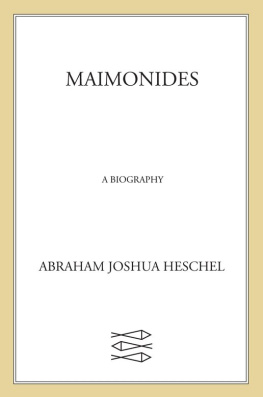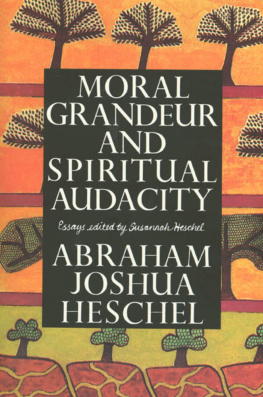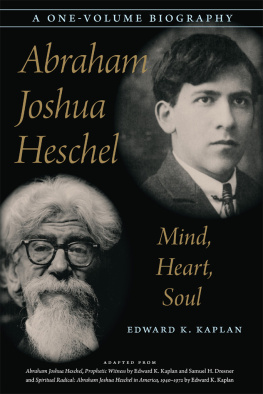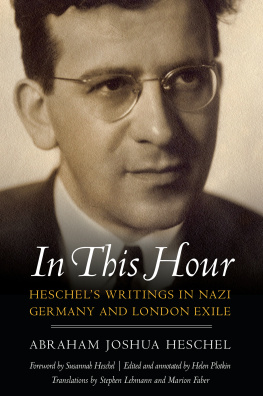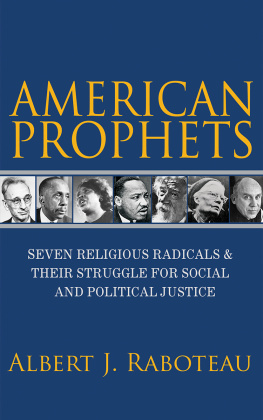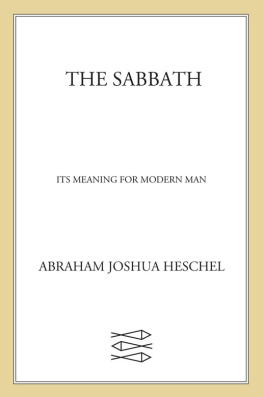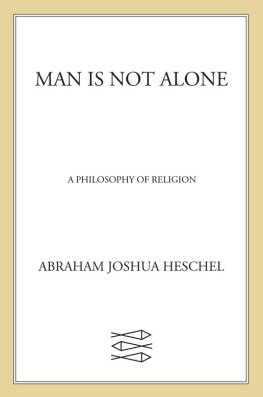ABRAHAM JOSHUA HESCHEL, one of the great creative Jewish scholars and thinkers, was born in Warsaw in 1907. A descendant of a long line of scholars going back to the sixteenth century, his intensive early education in Torah and Talmud was imbued with piety. He entered the University of Berlin in 1927 and received his Ph.D. in philosophy in 1933. While a student at the university, he also studied at the Hochschule fur die Wissenschaft des Judentums (Academy for Jewish Studies). In 1936, Die Prophetie, his dissertation, was published. It later became part of his classic work The Prophets, published in English in 1962.
In 1937, Martin Buber chose Heschel as his successor at the Judisches Lehrhaus of Frankfurt am Main. But the clouds of anti-Semitism darkened and Jews of Polish citizenship were expelled from Germany in 1938. After a brief return to Warsaw in 1939, he left for Londononly two months before the German invasion of Poland and the holocaust that followed. Heschel narrowly escaped extermination at the hands of the Nazis. He described himself as a brand plucked from the fire, in which my people was burned to death millions of human lives were exterminated to evils greater glory
In 1940 he came to the United States to join the faculty of Hebrew Union College in Cincinnati, where he remained for five years as Professor of Philosophy and Rabbinics. From 1945 until his death, he was Professor of Jewish Ethics and Mysticism at the Jewish Theological Seminary of America. In 19656, he was the first Harry Emerson Fosdick Visiting Lecturer at Union Theological Seminary. He also lectured at the universities of Minnesota, Iowa, and Stanford.
Rabbi Heschel was a devout Jew whose compassion embraced all mankind. My major concern is the human situation, he once said. I maintain that the agony of contemporary man is the agony of the spiritually stunted man. In the same spirit he held that the main theme of Jewish law is the person rather than an institution, and that the highest peak of spiritual living is not necessarily reached in rare moments of ecstasy; the highest peak lies wherever we are and may be ascended in a common deed. Religion is not made for extraordinary occasions. He epitomized his interpretation of law in this definition: An act of injustice is condemned, not because the law is broken, but because a person has been hurt.
Heschel was in the forefront of every human concern. In the spring of 1965, he marched with Martin Luther King, Jr., at Selma, Alabama; he was a leader in the protests against American policy in Vietnam; he participated in many civil-rights marches and peace rallies. Following the Six-Day War in 1967, he responded to the historic moment with his book Israel: An Echo of Eternity. He was one of the first to urge world Jewry to come to the aid of Soviet Jews. He was a strong ecumenicist, urging Christian-Jewish dialogue. He was frequently invited to the Vatican and was asked to speak on prayer on Italian radio and television. Although he suffered a near-fatal heart attack in 1969, he continued his strenuous activities in behalf of human rights.
All humanity was his concern. To be human, he said, is to be involved, to act and to react, to wonder and to respond. For man to be is to play a part in a cosmic drama, knowingly or unknowingly. As he saw it, Living involves responsible understanding of ones role in relation to all other beings. He also wrote: God in the universe is a spirit of concern for life We often fail in trying to understand Him, not because we do not know how to extend our concepts far enough, but because we do not know how to begin close enough. To think of God is not to find Him as an object in our minds, but to find ourselves in Him.
Following his sudden death, tribute was paid to him the world over. In this country, the Jesuit publication America devoted an entire issue (March 10, 1973) to Heschels memory. The editor stated: Each of you, our readers, will have his own lesson to learn from Abraham Joshua Heschel as he speaks to you of the living tradition of Judaism, in all its energy, holiness and compassion. May the God whom Jews, Christians and Muslims worship bring us to live together in peace and understanding and mutual appreciation.
Rev. Dr. John C. Bennett wrote in the same issue: Abraham Heschel belonged to the whole American religious community. I know of no other person of whom this was so true Dr. Bennett was president of Union Theological Seminary when Dr. Heschel served as a Visiting Professor.
Professor Fritz A. Rothschild of the Jewish Theological Seminary wrote in America: We find ourselves confronted with a style that exhibits a beauty and vividness of phrase rarely found in scholarly works. The ideas appear in aphoristic flashes of insight spiritual gems the easy-flowing prose hides subtle and complex thought processes that are ours to discover only if we delve beneath the smooth surface and study each passage in depth.
My selections from the works of Abraham Joshua Heschel represent a personal response to his prophetic genius. This book, conceived during his lifetime, is offered as an introduction to his thought and to his profound insight into the agonies of modern society. As such, this anthology focuses on one idea, sometimes one phrase, at a time; it attempts, in his own words, to stand still and consider.
The idea for this book was born in 1971. When Professor Heschel and his wife, Sylvia, visited our home in December of that year, I showed him my preliminary outline, which he studied carefully. During the following year he offered practical implementation for its publication. He introduced me to Lily Edelman, Bnai Briths director of adult education, who subsequently played a major role in seeing the book through to fulfillment.
Choosing selections from Heschels many works was an awesome responsibility. I received great encouragement throughout from Sylvia Heschel, whose enthusiasm, cooperation, and friendship remain a source of inspiration. My concern for and involvement in Judaism were deeply influenced by the Brandeis Camp Institute experiences over many years (Dr. Shlomo Bardin, Founder-Director). My appreciation is due to Susannah Heschel, who follows in her fathers footsteps, preparing to teach theology and philosophy; to Dr. George Shecter for his constant interest; and to Christine Davis for secretarial assistance.
I approached the task with reticence. Thanks to the unfailing encouragement of my husband, Dr. Victor Goodhill, I was inspired to complete this labor of love.
We were expecting the Heschels for a visit with us here on December 24, 1972. On December 23, Shabbat Vayechi 5733, Rabbi Abraham Joshua Heschel died in his sleep.
RUTH MARCUS GOODHILL
Los Angeles
March 24, 1975


 / To Dean and Barbara
/ To Dean and Barbara
